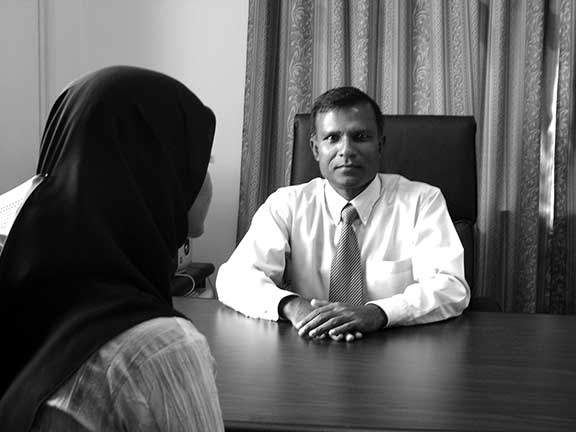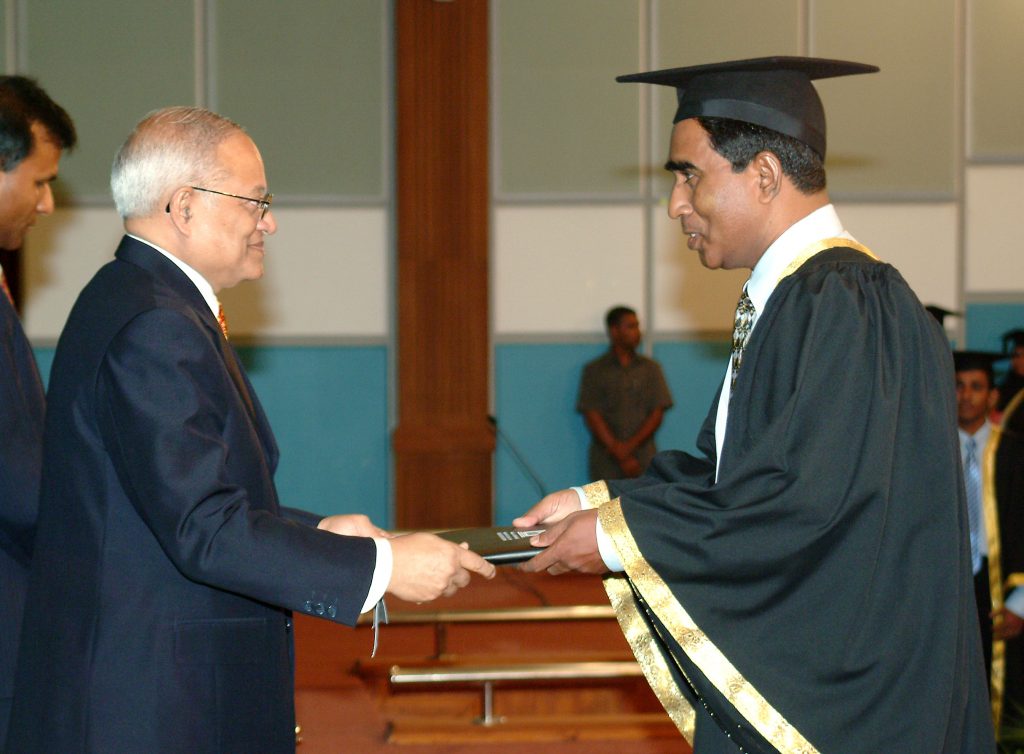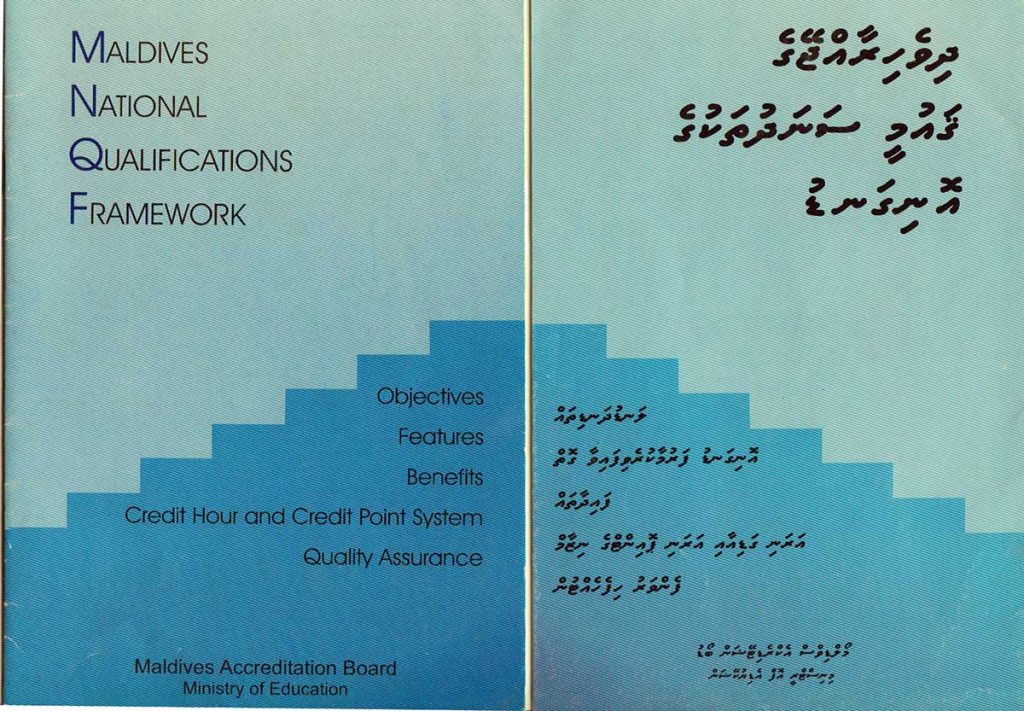The interview below, conducted in 2007, gives a brief history of the Maldives Accreditation Board (MAB), now known as the Maldives Qualifications Authority. This is the Part 1 of a three-part series on quality assurance in education especially higher education in the Maldives. This first part traces the development of MAB from 1998 to 2008. In forthcoming articles what happened to the government quality assurance mechanism in the years since will be outlined. ![]()

The Maldives Accreditation Board (MAB) was established by a decree of the President on 14th August 2000. It is the general mechanism by which most government institutions have been established in the past. The founding of MAB was a fundamental and critical step in enabling private providers to enter the higher education market, assuring the public of quality and confidence of their programmes. The years following MAB were to see a huge increase in the social demand of higher education and a mushrooming of higher education providers. In addition, the years saw the commoditization of higher education as an article of international service trade. It soon became imperative for the government to be able to establish equivalencies among awards issued by myriad regional and extra-regional institutions. This is partly because the government had begun to provide a substantial monetary “allowance” for those who have recognized certificates. The nature of school curriculum acted as a catalyst to steer the great number of school leavers towards higher education.
There were no such singular institutions of quality assurance in South Asia at that time; and the Board was, in that sense, unique in the region. For this historical perspective of the Board, we interviewed Dr Hassan Hameed, the Rector of the Maldives College of Higher Education who had witnessed the development of the Board from its conceptualization to establishment.
Shifa: When was the idea of MAB conceived?
Hassan: I first saw the concept document of MAB in 1998. The government had wanted to amalgamate the then existing institutions of higher education to rationalize resources and enhance efficiency. The institutions were to be merged to form a College. To facilitate this process, a Technical Assistance (TA) was secured through the Asian Development Bank. Maldives College of Higher Education (MCHE) was formed on 1st October 1998 and I was appointed its Principal. The consultant who provided the TA was, as I recall, the founding vice chancellor of the University of South Australia. The TA was fielded in two phases. At the end of Phase 1, Professor Mead, the consultant, gave me the draft report on 6th November 1998. In the draft he had outlined a conception of the Accreditation Board which is the precursor to the MAB. [This is the relevant section of the Report]
Shifa: What were the Consultant’s recommendations in the draft report?
Hassan: Prof. Mead had written a full page on the Accreditation Board. The outline contains the suggested membership — the Vice Rector – Academic as the Chairman, a member from the Ministry of Education, two deans, two external members of College Council and one academic staff member of the Council.
He had also outlined the terms of reference in the report. There were to be five major functions of the Board which subsumes the mandate of the existing MAB. One of the terms indicates his conception of the Board: to develop for implementation accreditation regulations and procedures for the accreditation of (i) internal College programs, (ii) post-secondary programs in private institutions, (iii) private institutions offering post-secondary programs and qualifications. His view was MCHE would, in addition to being a provider itself, accredit the programs of private institutions on delegated authority from the Ministry of Education. In other words, the Accreditation Board was intended to be an organ of MCHE which in the absence of any higher education authority in the government structure was charged with the mandate of functions now being performed by the Department of Higher Education and Training.
Shifa: What did MCHE do following the report?
Hassan: MCHE inherited institutions with varying standards in certification as there was no coordination in award criteria nationally. What some institutions would call a diploma is equated to certificates in other institutions. The entry qualifications and duration varied for an award with the same name. The circumstances thus forced MCHE to rationalize the award scheme across the College. I had some background in qualification frameworks through a fateful trip I made in March 1998. That trip was to have important consequences for the early development of MCHE.
Shifa: What was that trip and what were the consequences?
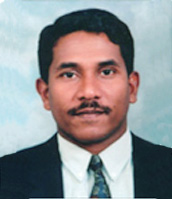 Hassan: There was a conference in March 1998 in Melbourne (Education for the 21st century in the Asia–Pacific region) organized by UNESCO. I accompanied the Minister of Education, Dr Mohamed Latheef to the conference in the capacity of the Chief Curriculum Coordinator at the Educational Development Centre. A group of Victorian Government officials desiring to obtain consultancies for an upcoming ADB-project handed the Minister some papers about the Australian Qualifications Framework and some promotional material for attracting overseas students. I brought these papers home and studied them.
Hassan: There was a conference in March 1998 in Melbourne (Education for the 21st century in the Asia–Pacific region) organized by UNESCO. I accompanied the Minister of Education, Dr Mohamed Latheef to the conference in the capacity of the Chief Curriculum Coordinator at the Educational Development Centre. A group of Victorian Government officials desiring to obtain consultancies for an upcoming ADB-project handed the Minister some papers about the Australian Qualifications Framework and some promotional material for attracting overseas students. I brought these papers home and studied them.
That conference was attended by 600 delegates from 60 nations. We were enthused by some very imaginative speakers. A particularly original speaker was from Papua New Guinea who spoke about the importance of cultural relevance in education. Inspired by his speech, a discussion at the official dinner was about starting a Dhivehi degree course at the Institute of Teacher Education (ITE) which was under the Ministry of Education. Dr Latheef had always manifest a pattern of thought and actions indicative of a deep respect for the sacrosanctity of Maldiviana. I do not know whether the Dhivehi Degree was envisioned by ITE itself or it was on Minister’s order, but some ITE staff had known about it when the College formed.
Shifa: What did MCHE do on accreditation following the report?
Hassan: The oversight of all institutes came under MCHE on January 1st 1999. Even before, the rationalization of awards was considered a priority. The only viable option was to develop a qualifications framework to provide a structure to the awards.
Towards this end, in April 1999 we circulated a paper to all deans on semesterization of academic terms, to have the same start and end dates for the academic year. The semesterization paper also stipulated the subject or module codes and credit system of the College drawn from available work time calculations at ITE for a typical student. As I recall, we considered 1200 hours of on-task time equivalent to an year of full-time study. We knew this varied between 900 to 1330 hours in our studies of some universities. The credit point value per semester of full time study was set at 48, a number which is divisible by 2, 3, 4, 6, 8 and 12 which would enable whole number credit points for almost all the subjects.
I had already prepared the first draft of the Maldives National Qualifications Framework based on the Victorian document on Australian National Qualifications Framework and the National Vocational Qualifications, NVQ (UK). It was meant for the College. To distinguish the qualifications in the framework from other qualifications with the same name, the word “national” was considered. In fact, the Diploma in Secondary Teaching (DST) offered at the Faculty of Education (FE) was renamed on our suggestion to National Diploma in Secondary Teaching (NDST) in 1998 in view of the forthcoming Qualifications framework while the jurisdiction of FE, or ITE as it was then called, was in the Ministry of Education. However, the then Deputy Minister of Education, Mr Abdul Hameed shied away from calling the qualification an Advanced National Diploma, which it was.
Another development which accelerated the development of the qualifications framework was the idea of starting the first home-grown degree. We want this degree to be a degree in Dhivehi Language and we want the first batch of students to graduate in the year the College would mark the fifth anniversary (that is in 2003). This means that all preparations for the degree must be complete before the end of the year 2000. There was a problem, however. Although we had some ideas about what a degree is as compared to a diploma or an advanced diploma, the key criteria for what constitutes a degree were not well established. A framework became critical.
A significant input to the development of the framework came from the New Zealand Qualifications Authority. The ADB Post-Secondary Development Project supported study visits of two officials to accreditation bodies. In one visit, Ms Khadeeja Adam, the present Executive Director of the Department of Higher Education and Training in her previous capacity as the Head of the Department of Public Examinations together with our Vice Rector (Academic) Mr Ahmed Ali Maniku took part. They visited Thailand and New Zealand to study accreditation systems in late November 1999. From their visit to the New Zealand Qualifications Authority (NZQA) both colleagues brought quality assurance documents for degree courses and other very useful information. We had by then almost all the information for what we want to do. I was then in touch with Dr Abdulla Saeed of Melbourne University as to what constitutes a degree. I was to find out soon that degree standards is a discipline unto itself and that most university staff are unaware of the requirements.
Shifa: Why was the Accreditation Board moved to the Ministry of Education?
Hassan: It was realized from the very beginning that the Accreditation Board functions were national and beyond the scope of MCHE. Significantly, we wanted the Board to be independent. If the Board is within the College there is a likelihood of an unhealthy influence for approving College-owned programmes which may stifle private sector participation in higher education.
For political reasons, MCHE was not placed under the Ministry of Education on its establishment though the ADB report initially stipulated it to be. There was no organ in the government then for higher education management. Ministry of Education seemed to be the most appropriate government body to carry out the work on qualifications. We requested the Office of the President on two occasions to establish the Board enclosing the qualification framework we have developed and appealing for early formation of MAB.
When MAB was instituted in August 2000, the Minister of Education accorded it a high priority. As a matter of fact, the Minister himself chaired the meetings in early development stages. There were several political changes which in some ways hindered or helped early functioning of the Board.
Shifa: What changes are you referring to and how did this impact the running of the Board?
Hassan: The Minister of Education, Dr Mohamed Latheef was relieved of his portfolio on 8th October 2002 and Mr Ismail Shafeeu became the new education minister. Dr Mahamood Shougee was appointed the Deputy Minister of Education on 9th October 2002. The Department of Higher Education and Training (DHET) was established on 19th November 2003 and Dr Abdul Muhsin Mohamed was appointed its Assistant Executive Director. The Maldives Accreditation Board became an organ administered by DHET.
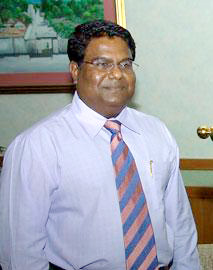 Dr Shougee expedited the early publication of the documents of MAB including the requirements for course approval and the National Qualifications Framework. One of the changes he made to the initial MCHE-produced documents was defining 45 credit points as the full-time academic load of a semester making it impossible to have four subjects of equal value of whole number credit points in a semester. In the early days of MAB, it was saddled with approving a large number of course documents and assessing both local and overseas certificates for equivalencies. Further, MAB did not have sufficient staff of calibre to carry through its mandate. However, it was during this time that some business processes were formulated and implemented in MAB.
Dr Shougee expedited the early publication of the documents of MAB including the requirements for course approval and the National Qualifications Framework. One of the changes he made to the initial MCHE-produced documents was defining 45 credit points as the full-time academic load of a semester making it impossible to have four subjects of equal value of whole number credit points in a semester. In the early days of MAB, it was saddled with approving a large number of course documents and assessing both local and overseas certificates for equivalencies. Further, MAB did not have sufficient staff of calibre to carry through its mandate. However, it was during this time that some business processes were formulated and implemented in MAB.
In another development, a follow-on ADB post-secondary education development project earmarked for MCHE was usurped in secret concert by the ministries responsible for planning and human resources, redirected, revised and renamed Employment Skills Training Project. This loan project (US$6.0 million) was approved on 2nd December 2003 and declared effective on 6th August 2004. When the dust settled, we were keen to maximize the benefits for MAB. Ministry of Education was able to include technical assistance for further development and training of two officers. These two left for training in 2006 to New Zealand. The technical assistance was to extend the Maldives National Qualifications to purposefully include vocational training. It is important to note that the Maldives National Qualifications Framework, as publicized, closely resembles that of Australia. The present Maldives National Qualifications Framework do not exclude vocational training, but skill assessment procedures of Australian framework were neither considered nor adapted for our context.
Shifa: How did MAB develop in the subsequent years?
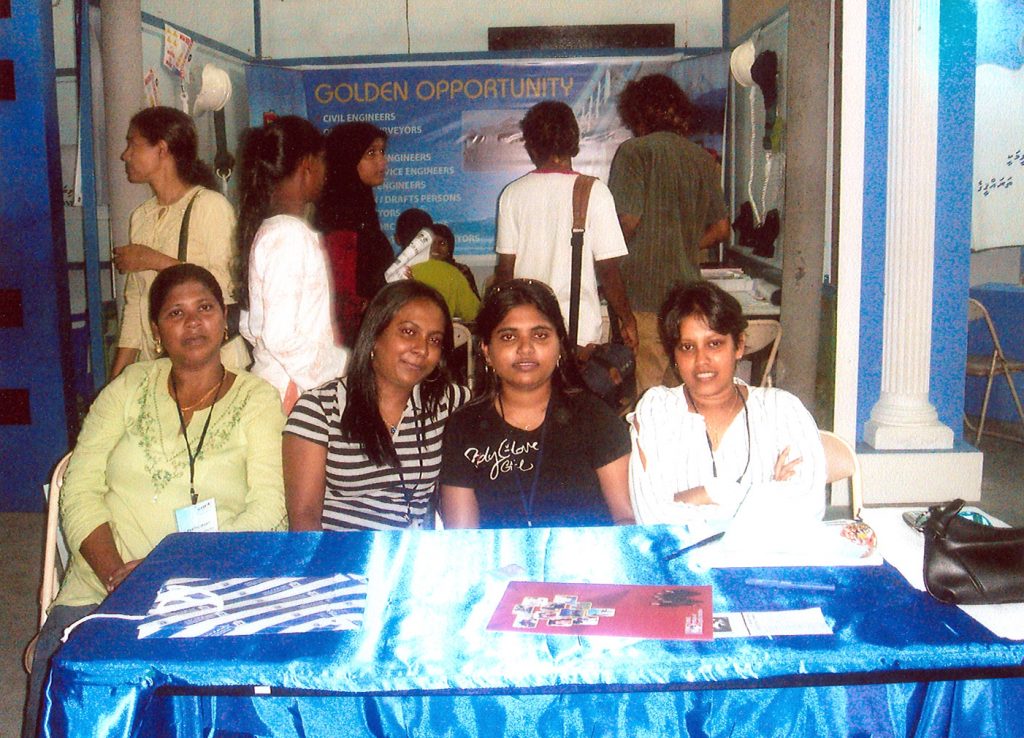 Hassan: Since 2005 onwards, the country saw a period of unsettled civil service administration, unprecedented volatile political changes. The changes led to the formation of the new Ministry of Higher Education, Employment and Social Security on 14th July 2005. Both DHET and MAB became organs of this ministry. In the early period of its development, there were attempts to rationalize the structure of the ministry but these attempts soon gave way to the grind of everyday administration. MAB, DHET and the government higher education institutions came under the oversight of the Ministry. Though we initially recommended to the Office of the President that MAB should be an independent body, MAB and the government post-secondary institutions are, as they were in latter years at Ministry of Education, now under the same Ministry. Ms Khadeeja Adam, who had been working at the Narcotics Control Bureau, was appointed the Executive Director of DHET on 30th August 2005. Mr Ahmed Anwar was appointed the Director General on 28th September 2005. As MAB is still not a separate government entity, but a “section” of the Ministry, his appointment at the Ministry is not tied to MAB by designation. But, Ms Khadeeja Adam told me that he had the primary responsibility for MAB. If that is the case, Mr Anwar is the first head with full-time responsibility for MAB, that is, if we think of Mr Shakoor who was transferred from Majeediyya School and headed MAB before his departure to Fareedhiyya as only an intern. I am not aware of noteworthy developments to MAB during Mr Anwar’s time in sufficient detail.
Hassan: Since 2005 onwards, the country saw a period of unsettled civil service administration, unprecedented volatile political changes. The changes led to the formation of the new Ministry of Higher Education, Employment and Social Security on 14th July 2005. Both DHET and MAB became organs of this ministry. In the early period of its development, there were attempts to rationalize the structure of the ministry but these attempts soon gave way to the grind of everyday administration. MAB, DHET and the government higher education institutions came under the oversight of the Ministry. Though we initially recommended to the Office of the President that MAB should be an independent body, MAB and the government post-secondary institutions are, as they were in latter years at Ministry of Education, now under the same Ministry. Ms Khadeeja Adam, who had been working at the Narcotics Control Bureau, was appointed the Executive Director of DHET on 30th August 2005. Mr Ahmed Anwar was appointed the Director General on 28th September 2005. As MAB is still not a separate government entity, but a “section” of the Ministry, his appointment at the Ministry is not tied to MAB by designation. But, Ms Khadeeja Adam told me that he had the primary responsibility for MAB. If that is the case, Mr Anwar is the first head with full-time responsibility for MAB, that is, if we think of Mr Shakoor who was transferred from Majeediyya School and headed MAB before his departure to Fareedhiyya as only an intern. I am not aware of noteworthy developments to MAB during Mr Anwar’s time in sufficient detail.
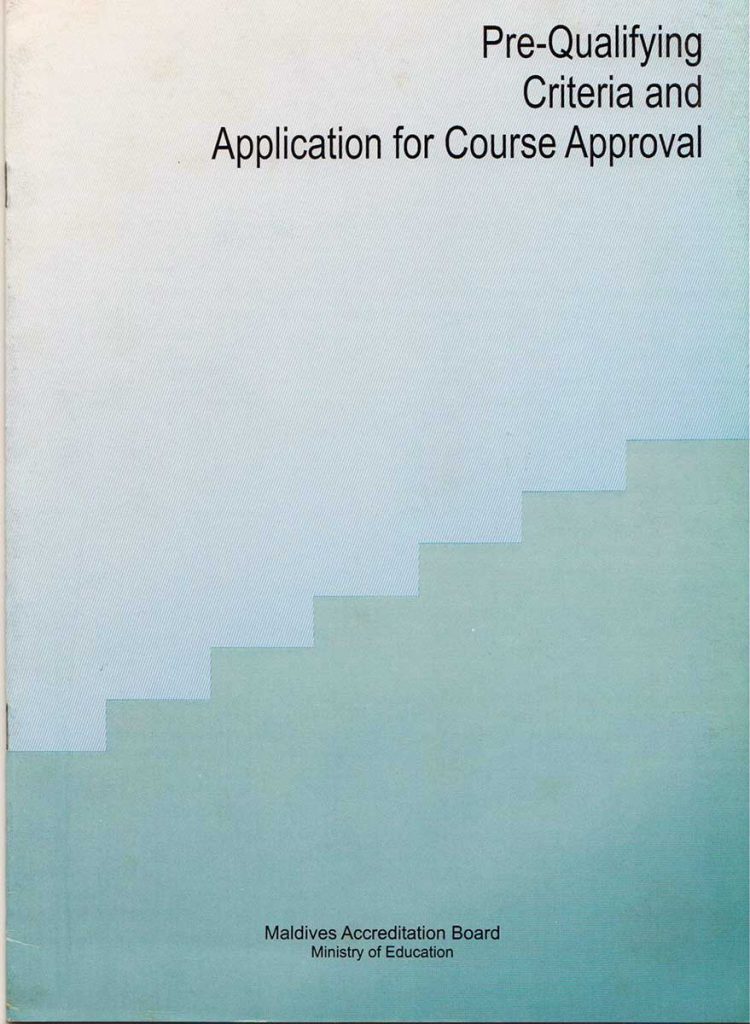
Shifa: What are some of the challenges at MAB, in your opinion?
Hassan: Organizations are built on the fundament of a committed competent team; people with passion for what they do. It is in this area that the greatest challenge exists. Institution building is neither an easy nor quick task. For a very long period, there were no full-time staff with a suitable knowledge base for leading the development of MAB. I recall that Dr Shougee, the former Minister of Education, telling me that he asked several senior Ministry staff to move to MAB but all of them refused. [He said only Aminath Asra agreed to be transferred, for whom he was most grateful]. I have raised the issue of human resources of MAB at several meetings but had not seen real political will to provide MAB the resources it needs. Few can appreciate the great work that lies ahead at MAB and its consequences for national development. I believe that goes for the Office of the President which appropriates funds and sets cadres for government offices.
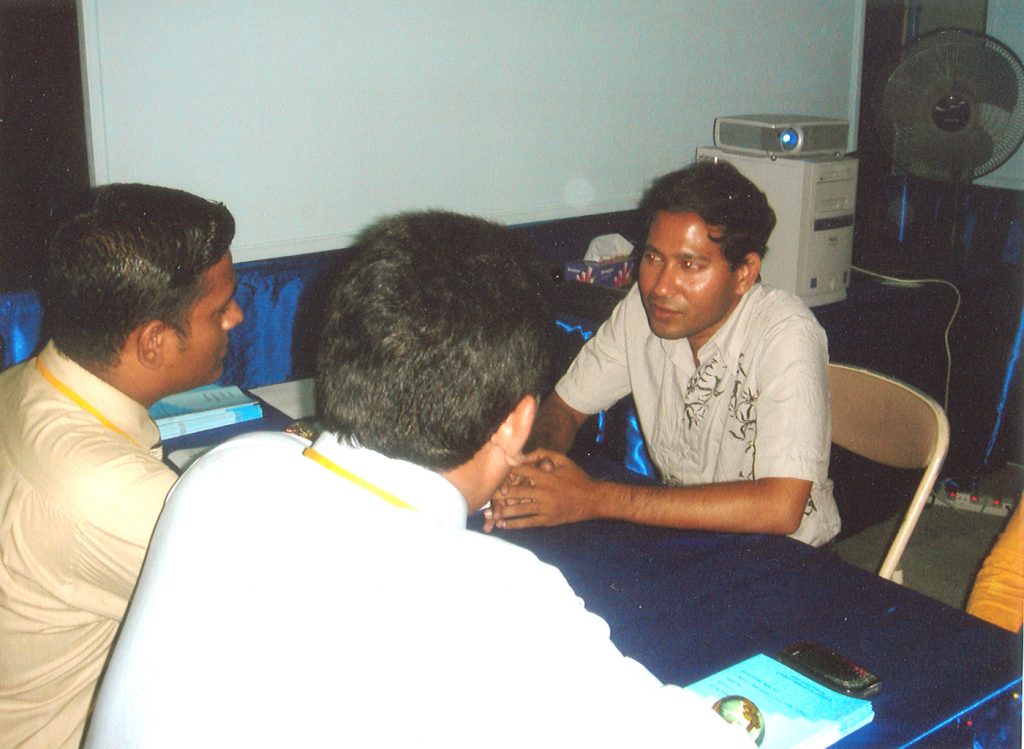 There are many procedures and business processes to be developed to ensure that we have a functioning MAB along the same lines of better known such bodies. The framework is in need of revision to reflect the changes that have taken place in the European Qualification Framework to enable qualification portability and international quality assurance and recognition. I have no doubt that MAB will grow from strength to strength and will eventually become autonomous, as it should be.
There are many procedures and business processes to be developed to ensure that we have a functioning MAB along the same lines of better known such bodies. The framework is in need of revision to reflect the changes that have taken place in the European Qualification Framework to enable qualification portability and international quality assurance and recognition. I have no doubt that MAB will grow from strength to strength and will eventually become autonomous, as it should be.
Note: This interview was conducted in 2007. The opinions expressed in the interview do not reflect that of either the Maldives Accreditation Board or the Department of Higher Education Training.
Important original documents on quality assurance in education are here [This link is not enabled yet].

